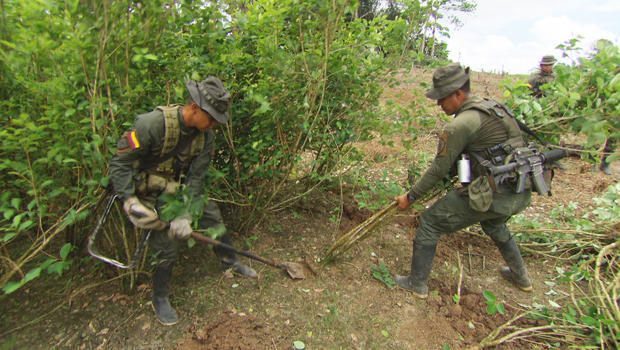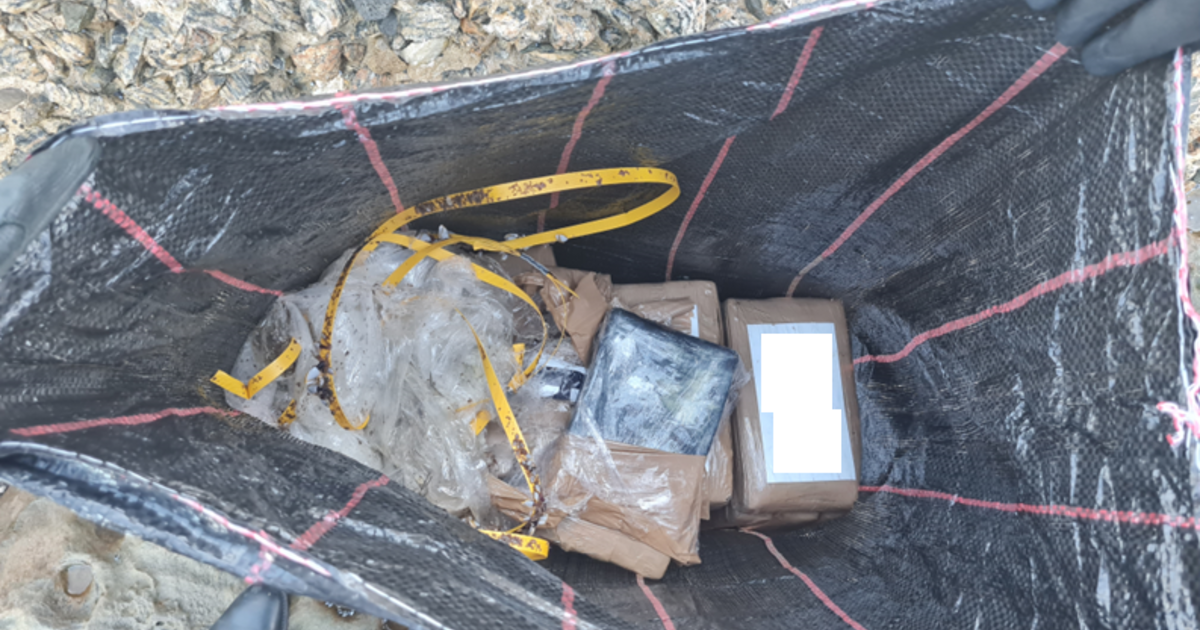Inside Colombia's efforts to stem cocaine production, one coca plant at a time
Vice President Mike Pence told the president of Colombia last night that he is very concerned by the "dramatic increase" in cocaine production. Coca is the raw ingredient for cocaine, and it's being grown in record amounts. Production has surged more than 130 percent since 2013.
Colombia is the main supplier of cocaine to the United States, where overdose deaths increased 25 percent between 2014 and 2015.
From the air, flying aboard armed helicopters with the national police, it is easy to spot the bright green plots of coca scattered below in the jungle territory of Nariño, the "cocaine capital" of Colombia.
Major Carlos Angarita, who is leading this eradication operation, landed at his team's next target.
Here, the war on drugs is fought with shovels, pulling the coca plants up by the roots.
"It's not an easy job," Major Angarita told CBS News correspondent Manuel Bojorquez. "There's no way around it. Twenty-four hours a day, seven days a week, 365 days a year. This is permanent."
For many peasant farmers, growing coca -- though illegal -- is the only source of income. Drug traffickers buy the leaves and use jungle labs to turn them into cocaine.
In Nariño, coca now covers more than 100,000 acres.
The crop spiked after the government grounded aerial spraying because of health concerns in 2015. Then, farmers planted more coca after last year's peace deal with the Revolutionary Armed Forces of Colombia (FARC) rebels, which provided incentives for coca farmers to switch to other crops.
Bo Mathiasen, head of the U.N.'s office on drugs and crime in Colombia, told Bojorquez the peace deal also created a power vacuum.
"There is a new sort of quest for who is going to be in control of the territories or these areas," Mathiasen said. "And therefore, also of the lucrative business of the coca and cocaine."
"This is simple math," said Kevin Whitaker, the United States' ambassador to Colombia. "More coca means more cocaine, means more problems with public health and public security in both countries."
Since the days of Pablo Escobar, the U.S. has been helping to fund Colombia's fight against drug traffickers, providing $10 billion in aid since 2000. But the Trump administration has proposed cutting aid next year by 36 percent.
Colombia's defense minister, Luis Carlos Villegas, is concerned.
"We cannot replace the U.S. -- intelligence, mobility, technology," Villegas said. "So yes, of course we care about those cuts and we will insist to the administration that the numbers should be maintained."
Angarita is concerned about the cuts as well.
"I think we need to make the best possible case to the U.S. Congress that our efforts here are effective," Angarita said. "And that what we're doing can help protect Americans in the homeland. And I think we can make that argument."
Back in the jungle, Angarita says either way he will keep working for his country.
Bojorquez asked, "When you hear there's a record number, is it demoralizing?" To which Angarita replied, "(It) makes you want to work harder."
The goal is to bring that number down, he says, no matter what it takes. "Coca zero."
Even if it means doing it one coca plant at a time.
Tomorrow on "CBS This Morning," Manuel Bojorquez takes us inside the U.S. government's task force that targets drug traffickers on the high seas before they reach our territory.




